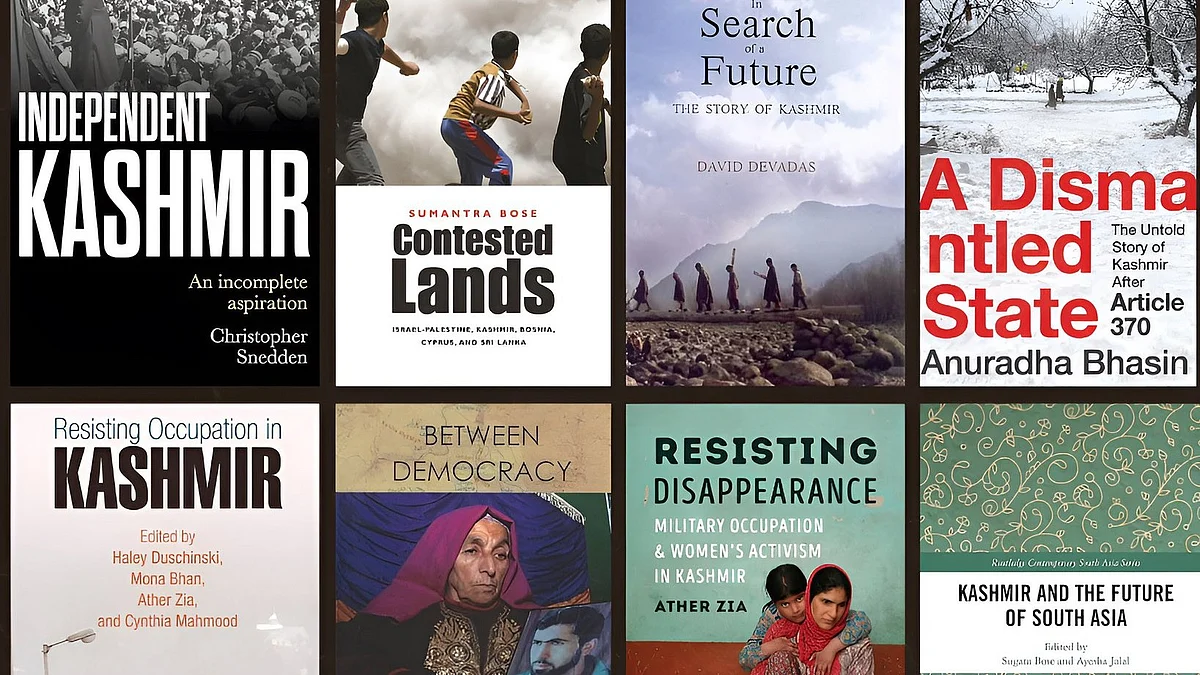A story of ‘false narratives’: Jammu and Kashmir UT bans 25 books in “most regressive” move
Among the authors whose books have been banned are A.G. Noorani, Arundhati Roy, Anuradha Bhasin, Sumantra Bose and Christopher Snedden

In an unprecedented move, the Jammu and Kashmir administration under lieutenant governor Manoj Sinha has banned 25 books, alleging that they promote a ‘false narrative’ and ‘secessionism’ in the union territory — days after inaugurating the Chinar Book Festival in Srinagar.
The banned titles include works by Booker Prize-winning author Arundhati Roy, constitutional expert A.G. Noorani and prominent journalist Anuradha Bhasin. The order, issued by the Jammu and Kashmir home secretary, cites a "systemic dissemination of false narratives and secessionist literature" disguised as historical or political commentary — a position purportedly based on investigations and credible intelligence inputs.
Among the banned works is Noorani’s The Kashmir Dispute 1947–2012, a detailed account of the region’s constitutional history, which had been cited by the Supreme Court in the Article 370 case. Roy’s Azadi, published by Penguin India, and Bhasin’s The Dismantled State: The Untold Story of Kashmir After 370 have also been banned.
Reacting to the ban, Bhasin posted on: “I've read most of these books [and] written one. They're well researched [and] not one glorifies terrorism, which this govt claims to have ended. Scared of words challenging your lies!.”
Other banned authors include British historian Victoria Schofield, whose book Kashmir in Conflict: India, Pakistan and the Unending War is widely referenced in Kashmir studies. Two books by Sumantra Bose — Contested Lands and Kashmir at the Crossroads — have also been proscribed.
Bose, a professor of international and comparative politics at the London School of Economics, has extensively written on Kashmir’s political landscape.
The official order invokes Section 98 of the Bhartiya Nagarik Suraksha Sanhita, 2023, declaring all 25 titles “forfeited”.
It further states that the content of these books “excites secessionism and endangers the sovereignty and integrity of India”, thus attracting provisions under Sections 152, 196 and 197 of the Bhartiya Nyaya Sanhita, 2023.
The decision has drawn sharp criticism from opposition parties and civil society.
Author Nilanjana Roy called it a “spectacularly ill-advised move”, this “book ban to advertise your insecurities”. Her post on X suggested the notification provided, in effect, a “brilliantly curated reading list on Kashmir” (words that were struck through but left quite readable in the post).
Mirwaiz Umar Farooq, chairman of the All Parties Hurriyat Conference, said: “Banning books by scholars and reputed historians will not erase historical facts or the lived memories of the people of Kashmir. It only exposes the insecurities and limited understanding of those behind such authoritarian actions — especially when the government is simultaneously hosting a Book Festival to showcase its literary commitment!”
RJD MP Manoj Jha called the move “regressive”, adding: “Banning of books reflects an inherent fear of ideas, debate and dissent. Democracies thrive on the free exchange of thoughts, even uncomfortable or critical ones. This act signals not the strength but the insecurity of those in power.”
He further warned that censorship of literature stifles imagination, intellectual freedom and the people's right to form independent opinions:
“In place of nurturing an informed citizenry, it pushes society toward ignorance and conformity. A confident democracy must allow space for every voice — even the ones it disagrees with.”
The CPI(M) also condemned the ban in a statement, saying:
“On the sixth anniversary of the BJP’s dismantling of Article 370, the J&K administration has chosen to ban 25 books, including A.G. Noorani’s work that was cited by the Supreme Court... This is a blatant attack on democratic rights and academic freedom. We strongly condemn this brazen act of censorship.”
Polit Bureau member from Kerala Subhashini Ali posted, “First they said terrorism would vanish after demonetisation, then after 370 revocation, now after banning of books!!” She was one of those to point out three of the titles are by Sumantra Bose and Sugata Bose — great-nephews of Netaji Subhas Chandra Bose
David Devadas, author of Kashmir: In Search of a Future, ruefully noted that once upon a time, former defence minister George Fernandes had told him his book — now banned — was “exactly as it should be”.
A bookstore in Imphal, Manipur, posted images of some of the books’ covers, saying they “must be worth reading”.
Independent journalist Sumit Chaturvedi was full of caustic praise, conversely: “People have to watch movies and Netflix series to feel what it's like living in a dystopia. We're so lucky that we experience it first hand where researched scholarship is banned but films like Kashmir Files are celebrated!”
Another netizen suggested “Amrit Kaal must show a radical approach to nation-building” and possibly take it further, banning reading and writing.
Follow us on: Facebook, Twitter, Google News, Instagram
Join our official telegram channel (@nationalherald) and stay updated with the latest headlines
